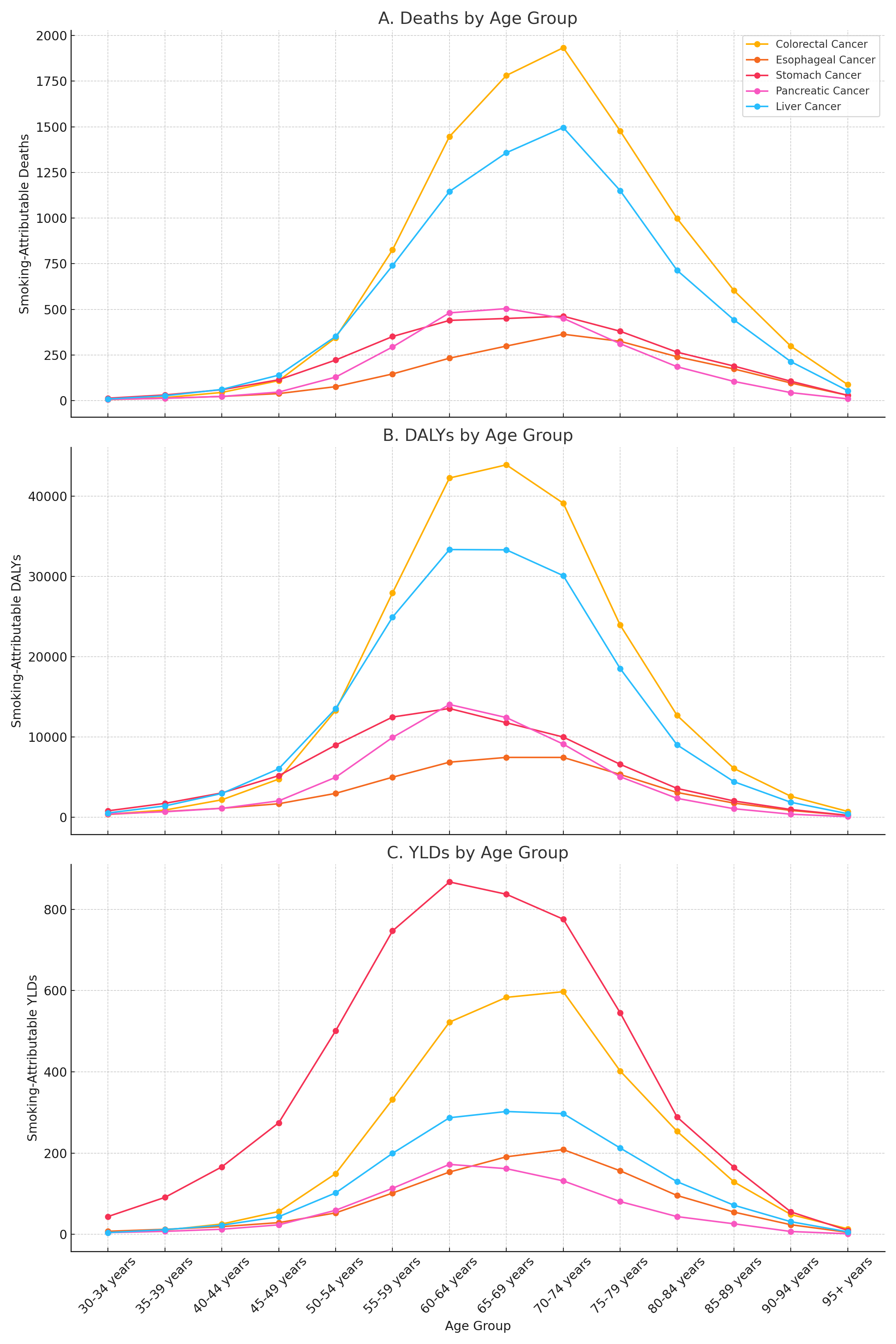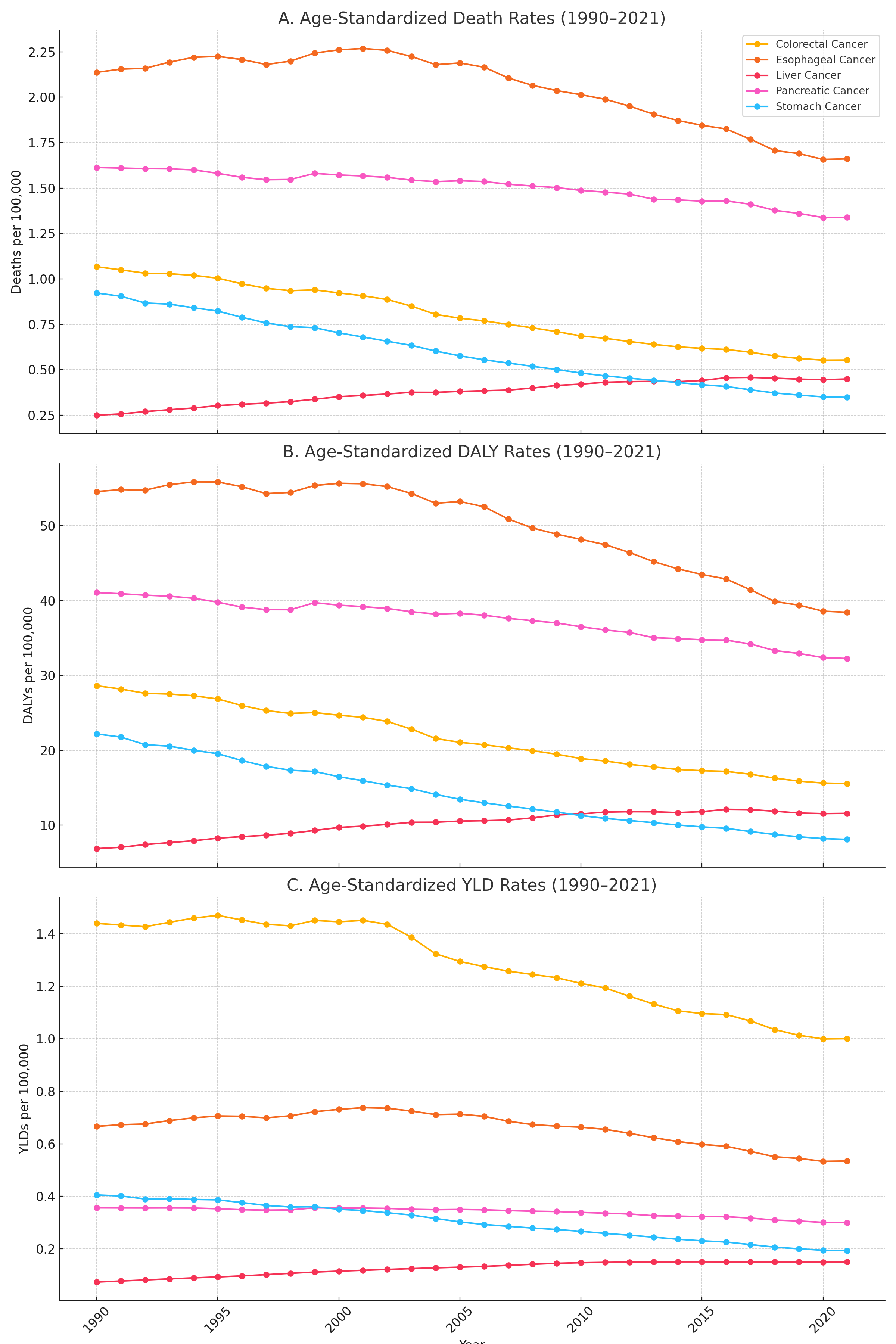Monday Poster Session
Category: Esophagus
P2778 - Trends and Burden of Gastrointestinal Cancers Attributable to Smoking in the United States, 1990–2021: Insights From the GBD 2021 Comparative Risk Assessment Framework
Monday, October 27, 2025
10:30 AM - 4:00 PM PDT
Location: Exhibit Hall
.jpeg.jpg)
Bhargav Koyani, MBBS
Saint Francis Hospital, Evanston
Evanston, IL
Presenting Author(s)
Bhargav Koyani, MBBS1, Dhruv Gadhiya, MD2, Jeel Patel, MBBS3, Shivam Kalra, MBBS, MHA4, Pragathi Munnangi, MD5, Sai Koushik, MBBS6, Sagar K. Patel, MBBS7, Chandana Tummala, MBBS8, Dhwani Vaghani, MBBS9, Jay Patel, MBBS10, Hardik Dineshbhai Desai, MBBS11
1Saint Francis Hospital, Evanston, Evanston, IL; 2St. Luke's Hospital - Anderson Campus, Easton, PA; 3Gujarat Adani Institute of Medical Sciences, Bhuj, Gujarat, India; 4Trident Medical Center, North Charleston, SC; 5BronxCare Health System, New York City, NY; 6Internal medicine, clinikk hub, banglore, karnataka, india-560097, Bangalore, Karnataka, India; 7Gujarat Adani Institute of Medical Sciences, Kheda, Gujarat, India; 8Internal Medicine, Vydehi Institute Of Medical Sciences and Research Centre, Whitefield-560066, Bangalore, Karnataka, India, Bangalore, Karnataka, India; 9Internal Medicine, MGM Medical College, Aurangabad, Maharashtra, India,431003, Aurangabad, Maharashtra, India; 10MGM Medical College, Aurangabad, Maharashtra, India-431003, Aurangabad, Maharashtra, India; 11Independent Researcher, Ahmedabad, Gujarat, India
Introduction: Tobacco use remains one of the most significant preventable causes of gastrointestinal (GI) cancers in the United States. Despite public health efforts to curb smoking, its long-term effects on cancer burden across digestive organs remain underexplored in comprehensive temporal frameworks.
Methods: Utilizing the Global Burden of Disease Study 2021 comparative risk assessment framework, we quantified the burden of GI cancers attributable to smoking from 1990-2021 in the United States. Population-attributable fractions (PAFs) were estimated by comparing observed tobacco exposure distributions to theoretical minimum risk exposure levels (TMRELs). These PAFs were applied to total deaths, disability-adjusted life years (DALYs), and years lived with disability (YLDs) from GI cancers—including esophageal (EC), stomach (SC), colorectal (CRC), pancreatic (PC), and liver cancers (LC)—to estimate smoking-attributable fractions.
Results: From 1990-2021 in the United States, smoking-attributable deaths due to LC rose from 774 (249–1,323) to 2,606 (807–4,612), PC from 5,096 (4,525–5,757) to 7,902 (6,668–9,411), and EC from 6,708 (5,350–7,955) to 9,973 (7,531–12,487). In contrast, deaths declined for CRC from 3,361 (2,084–4,705) to 3,115 (1,852–4,473), and SC from 2,974 (2,384–3,577) to 2,064 (1,597–2,577). Overall, DALYs due to smoking-related GI cancers increased from 460,872 (358,295–563,295) in 1990 to 591,286 (431,941–759,946) in 2021, reflecting a shift toward increased chronic disability among survivors. Age-wise, in 2021, smoking-attributable GI cancer deaths peaked in the 70–74 age group, with DALYs highest in the 65–69 group. CRC contributed the greatest share of YLDs, peaking in the 70–74 age group. Gender-wise, males consistently exhibited higher APCs than females, with the steepest increases in LC (4.05% vs. 3.83%), followed by PC (1.45% vs. 1.39%) and EC (1.47% vs. 0.43%), while CRC (–0.24% vs. –0.25%) and SC (–1.28% vs. –0.91%) showed declining trends.
Discussion: From 1990-2021, smoking-attributable GI cancer burden in the U.S. rose markedly—driven by increases in LC, PC, and EC deaths and DALYs—while CRC and SC declined; the burden was highest among older adults, more pronounced in males, and showed sharpest state-level rises in LC mortality. These trends underscore a growing chronic disability burden and the need for targeted, sex- and region-specific tobacco control efforts.

Figure: Trend and Burden of Gastrointestinal Cancer Attributable to Smoking in the United States from 1990-2021, Age-standardized rate per 100,000

Figure: Age wise Distribution of Gastrointestinal Cancer Attributable to Smoking in the United States in 2021
Disclosures:
Bhargav Koyani indicated no relevant financial relationships.
Dhruv Gadhiya indicated no relevant financial relationships.
Jeel Patel indicated no relevant financial relationships.
Shivam Kalra indicated no relevant financial relationships.
Pragathi Munnangi indicated no relevant financial relationships.
Sai Koushik indicated no relevant financial relationships.
Sagar Patel indicated no relevant financial relationships.
Chandana Tummala indicated no relevant financial relationships.
Dhwani Vaghani indicated no relevant financial relationships.
Jay Patel indicated no relevant financial relationships.
Hardik Dineshbhai Desai indicated no relevant financial relationships.
Bhargav Koyani, MBBS1, Dhruv Gadhiya, MD2, Jeel Patel, MBBS3, Shivam Kalra, MBBS, MHA4, Pragathi Munnangi, MD5, Sai Koushik, MBBS6, Sagar K. Patel, MBBS7, Chandana Tummala, MBBS8, Dhwani Vaghani, MBBS9, Jay Patel, MBBS10, Hardik Dineshbhai Desai, MBBS11. P2778 - Trends and Burden of Gastrointestinal Cancers Attributable to Smoking in the United States, 1990–2021: Insights From the GBD 2021 Comparative Risk Assessment Framework, ACG 2025 Annual Scientific Meeting Abstracts. Phoenix, AZ: American College of Gastroenterology.
1Saint Francis Hospital, Evanston, Evanston, IL; 2St. Luke's Hospital - Anderson Campus, Easton, PA; 3Gujarat Adani Institute of Medical Sciences, Bhuj, Gujarat, India; 4Trident Medical Center, North Charleston, SC; 5BronxCare Health System, New York City, NY; 6Internal medicine, clinikk hub, banglore, karnataka, india-560097, Bangalore, Karnataka, India; 7Gujarat Adani Institute of Medical Sciences, Kheda, Gujarat, India; 8Internal Medicine, Vydehi Institute Of Medical Sciences and Research Centre, Whitefield-560066, Bangalore, Karnataka, India, Bangalore, Karnataka, India; 9Internal Medicine, MGM Medical College, Aurangabad, Maharashtra, India,431003, Aurangabad, Maharashtra, India; 10MGM Medical College, Aurangabad, Maharashtra, India-431003, Aurangabad, Maharashtra, India; 11Independent Researcher, Ahmedabad, Gujarat, India
Introduction: Tobacco use remains one of the most significant preventable causes of gastrointestinal (GI) cancers in the United States. Despite public health efforts to curb smoking, its long-term effects on cancer burden across digestive organs remain underexplored in comprehensive temporal frameworks.
Methods: Utilizing the Global Burden of Disease Study 2021 comparative risk assessment framework, we quantified the burden of GI cancers attributable to smoking from 1990-2021 in the United States. Population-attributable fractions (PAFs) were estimated by comparing observed tobacco exposure distributions to theoretical minimum risk exposure levels (TMRELs). These PAFs were applied to total deaths, disability-adjusted life years (DALYs), and years lived with disability (YLDs) from GI cancers—including esophageal (EC), stomach (SC), colorectal (CRC), pancreatic (PC), and liver cancers (LC)—to estimate smoking-attributable fractions.
Results: From 1990-2021 in the United States, smoking-attributable deaths due to LC rose from 774 (249–1,323) to 2,606 (807–4,612), PC from 5,096 (4,525–5,757) to 7,902 (6,668–9,411), and EC from 6,708 (5,350–7,955) to 9,973 (7,531–12,487). In contrast, deaths declined for CRC from 3,361 (2,084–4,705) to 3,115 (1,852–4,473), and SC from 2,974 (2,384–3,577) to 2,064 (1,597–2,577). Overall, DALYs due to smoking-related GI cancers increased from 460,872 (358,295–563,295) in 1990 to 591,286 (431,941–759,946) in 2021, reflecting a shift toward increased chronic disability among survivors. Age-wise, in 2021, smoking-attributable GI cancer deaths peaked in the 70–74 age group, with DALYs highest in the 65–69 group. CRC contributed the greatest share of YLDs, peaking in the 70–74 age group. Gender-wise, males consistently exhibited higher APCs than females, with the steepest increases in LC (4.05% vs. 3.83%), followed by PC (1.45% vs. 1.39%) and EC (1.47% vs. 0.43%), while CRC (–0.24% vs. –0.25%) and SC (–1.28% vs. –0.91%) showed declining trends.
Discussion: From 1990-2021, smoking-attributable GI cancer burden in the U.S. rose markedly—driven by increases in LC, PC, and EC deaths and DALYs—while CRC and SC declined; the burden was highest among older adults, more pronounced in males, and showed sharpest state-level rises in LC mortality. These trends underscore a growing chronic disability burden and the need for targeted, sex- and region-specific tobacco control efforts.

Figure: Trend and Burden of Gastrointestinal Cancer Attributable to Smoking in the United States from 1990-2021, Age-standardized rate per 100,000

Figure: Age wise Distribution of Gastrointestinal Cancer Attributable to Smoking in the United States in 2021
Disclosures:
Bhargav Koyani indicated no relevant financial relationships.
Dhruv Gadhiya indicated no relevant financial relationships.
Jeel Patel indicated no relevant financial relationships.
Shivam Kalra indicated no relevant financial relationships.
Pragathi Munnangi indicated no relevant financial relationships.
Sai Koushik indicated no relevant financial relationships.
Sagar Patel indicated no relevant financial relationships.
Chandana Tummala indicated no relevant financial relationships.
Dhwani Vaghani indicated no relevant financial relationships.
Jay Patel indicated no relevant financial relationships.
Hardik Dineshbhai Desai indicated no relevant financial relationships.
Bhargav Koyani, MBBS1, Dhruv Gadhiya, MD2, Jeel Patel, MBBS3, Shivam Kalra, MBBS, MHA4, Pragathi Munnangi, MD5, Sai Koushik, MBBS6, Sagar K. Patel, MBBS7, Chandana Tummala, MBBS8, Dhwani Vaghani, MBBS9, Jay Patel, MBBS10, Hardik Dineshbhai Desai, MBBS11. P2778 - Trends and Burden of Gastrointestinal Cancers Attributable to Smoking in the United States, 1990–2021: Insights From the GBD 2021 Comparative Risk Assessment Framework, ACG 2025 Annual Scientific Meeting Abstracts. Phoenix, AZ: American College of Gastroenterology.
